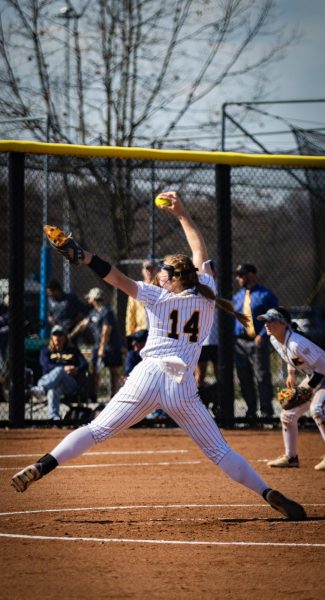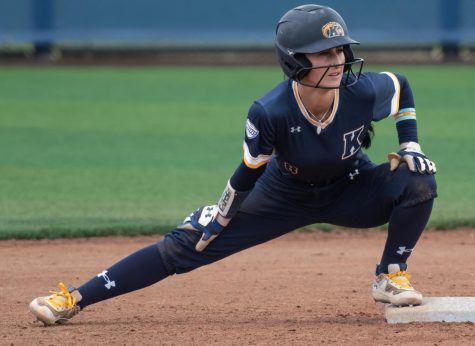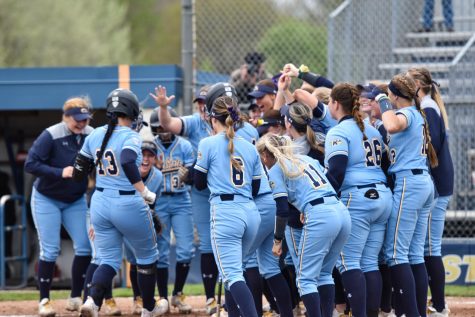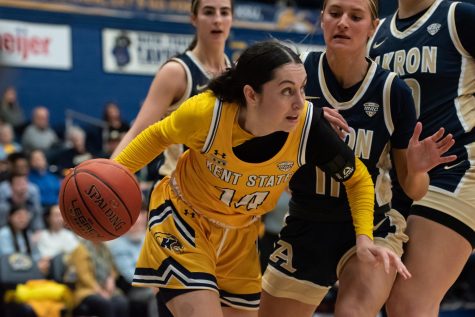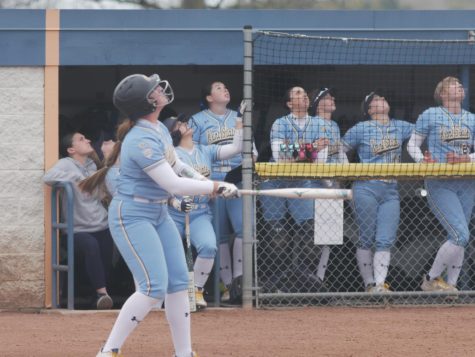Coming back to life
November 23, 2010
Marisa Manocchio lay on her couch unable to get up for days at a time. She spent her time watching the Food Network and eating more than usual because of the steroids that the doctor prescribed her.
When she managed to make her way up a flight of stairs, she fell on her way back down.
That was just months ago.
One football team and months of treatment later, her life is changed.
Marisa, a 19-year-old secondary mathematics education major at Kent State, found red dots on her chest and a softball-size bruise on her hip on Jan. 11, 2010. She didn’t bruise easily, so she went to her doctor the same day. The doctor suspected anemia and called for routine blood tests.
The results were grim.
Marisa’s body had an extremely low white blood cell count. So she was told by her doctor to rush to the hospital. She was scared. Her mind went on a roller-coaster of emotions.
Doctors took more blood samples and ran additional tests that took hours.
The results showed the worst-case scenario: Acute Lymphoblastic Leukemia, or cancer.
She did not know what to think. Should she be scared, frustrated, sad, angry or nervous? Her life would never be the same.
After being released from the hospital, Marisa’s treatment began. She underwent strenuous chemotherapy that left her body run down. Chemotherapy kills dangerous blood cells in the body, but also physically exhausts it. Marisa suffered from depression of the immune system, extreme fatigue and hair loss.
Her mother, Tia Schewada, said her daughter’s recovery was anything but easy.
“There were a lot of times that she had nightmares,” Schewada said. “She didn’t think she was going to make it and it was very frightening. She really did not see a light at the end of the tunnel.”
The illness took its toll on Marisa.
For almost eight months, her fatigue left her on the living room couch. Doctors prescribed her steroids to fight the side effects of chemotherapy. The medicine had Marisa eating more than usual while being confined to watching television. She was in the hospital for weeks at a time and even spent a month there.
Leukemia was destroying Marisa’s body. To prevent infections, her doctors did not want her leaving the house, and she was constantly in pain when she tried to walk.
Marisa was isolated from everything that was important to her.
The once energetic girl who loved school was forced to take the spring and fall semesters off. She was unable to leave the house to spend time with the people she loved and see the friends she was closest to.
Marisa was losing hope.
She was worn down. But to cope with her depression, she decided to help others who were struggling in a different way.
Marisa helped plan an event that benefited women in battered women’s shelters and natural disaster sites. The cause rejuvenated her. Bras Across the Crooked River, on Sept. 11, raised money to supply bras for victims through the charity organization Breasts Oasis. For help with planning the event, she contacted Kent State.
Casey Wolf, director of football operations, told Kent State coach Doug Martin of Marisa. Martin thought her story was inspirational and outstanding. To him, the decision to invite her to practice was an easy one.
When Marisa arrived at practice, she did not know what to expect. Martin handed her a jersey with her name on the back and delivered an invitation she would never forget. He asked Marisa to be the team’s honorary captain.
As a longtime football fan, she was ecstatic.
“At first, I just thought I was getting a jersey and then leaving and I was like, ‘Cool, that’s awesome,’” Marisa said. “Then they asked me to be the captain and I didn’t know what that meant. I thought they were just all going to be nice to me and they would just say my name or something, but they asked me to go to all of the games and be on the field and I was like, ‘Oh my gosh, this is really cool.’”
Martin said Marisa’s perseverance sets a perfect example of mental toughness for his team.
“I don’t know if it would work if it wasn’t somebody like her,” Martin said. “She’s got the perfect personality for this because I’m going to tell you what now, she’s tough. She gets hacked off if players don’t play well, and she lets them know about it. That’s what they need. They really respond to her and it’s been a great fit.”
Finally, on Sept. 18 in front of a crowd of more than 100,000 fans, Kent State’s captains walked to midfield for the game’s coin toss against Penn State.
They met the Nittany Lions’ captains and shook hands.
Senior running back Eugene Jarvis, sophomore quarterback Spencer Keith, senior safety Brian Lainhart, senior linebacker Cobrani Mixon and a 19-year-old girl.
The Nittany Lions’ captains did not know what to think.
Marisa was a part of the team. She rode with the players on the bus to games and was even asked to call heads or tails at the coin toss.
Junior kicker Freddy Cortez said Kent State’s newest addition reminds him of his cousin who battled cancer.
“It’s always nice to have something to look forward to,” Freddy said. “From what I see, she loves coming over here, she loves talking to everybody. She’s never down. She has this little spirit that when she’s around people, we just vibe off of that and just cheer her up because what we go through is nothing compared to what she goes through. If she can have a good life, why can’t we? If there’s anything we can do to make her happy or make her day better, we’re here to do it.”
Marisa fit in.
During team warm ups prior to Saturday games, Marisa dons the Flashes’ team apparel and watches as her friends prepare for the game. After months of torturous therapy and depression, she’s finally able to smile.
She struck up a friendship with one player in particular, 6-foot-8 freshman offensive lineman Max Plunkett.
The two met on the bus ride following the Flashes’ loss to Penn State, exchanging stories and eventually, phone numbers. Marisa and Plunkett text regularly, and the lineman said when the team’s captain needs someone to talk to, he is there.
“She tells me about the kind of stuff she goes through, what cancer has done to her, all of this stuff she’s lost and all of the opportunities it’s given her as well,” Plunkett said. “I know, at least in my particular case, I’m just someone to talk to. Especially earlier on, she would talk to me about what she was going through. She just needs someone to vent to and basically someone to listen. I guess the team gives her a lot of guys that care about her, that give her that opportunity or chance to vent.”
Marisa said that now she is with the football team, “It’s like I’m getting my life back again to the point I want it to be.”
The leukemia is in remission, but Marisa must undergo chemotherapy for two additional years as a precaution because the form of cancer has a higher risk of recurring.
She may thank the team for their part in her recovery, but Martin said the presence of Marisa has been invaluable to the Flashes.
“I hope we have helped her in some small way,” Martin said. “If it’s just support or prayers or whatever it is. I assure you that she’s done a lot more for us then anything we’ve done for her.”
Marisa is returning to school in the spring. She will be able to return to the worries and stress that school brings, but she loves it.
Just months after thinking that she may lose everything, Marisa ends the football season as a normal college girl — healthy and enjoying life.
It’s been almost surreal for Marisa, meeting Penn State coach Joe Paterno and Cleveland Browns wide receiver Josh Cribbs.
“I had no clue what I was getting myself into when I did this,” Marisa said. “I knew I would be on the same field, but I didn’t think I’d be able to meet (Paterno). It’s really unbelievable the things I’ve gotten to do and I’ve really been blessed.”
Contact Lance Lysowski at [email protected].














